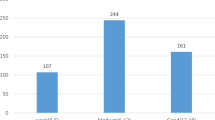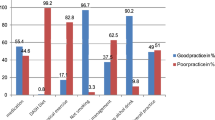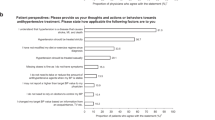Abstract
Despite many years of study, questions remain about why patients do or do not take medicines and what can be done to change their behaviour. Hypertension is poorly controlled in the UK and poor compliance is one possible reason for this. Recent questionnaires based on the self-regulatory model have been successfully used to assess illness perceptions and beliefs about medicines. This study was designed to describe hypertensive patients’ beliefs about their illness and medication using the self-regulatory model and investigate whether these beliefs influence compliance with antihypertensive medication. We recruited 514 patients from our secondary care population. These patients were asked to complete a questionnaire that included the Beliefs about Medicines and Illness Perception Questionnaires. A case note review was also undertaken. Analysis shows that patients who believe in the necessity of medication are more likely to be compliant (odds ratio (OR)) 3.06 (95% CI 1.74-5.38), P<0.001). Other important predictive factors in this population are age (OR 4.82 (2.85-8.15), P<0.001), emotional response to illness (OR 0.65 (0.47-0.90), P=0.01) and belief in personal ability to control illness (OR 0.59 (0.40-0.89), P=0.01). Beliefs about illness and about medicines are interconnected; aspects that are not directly related to compliance influence it indirectly. The self-regulatory model is useful in assessing patients health beliefs. Beliefs about specific medications and about hypertension are predictive of compliance. Information about health beliefs is important in achieving concordance and may be a target for intervention to improve compliance.
This is a preview of subscription content, access via your institution
Access options
Subscribe to this journal
Receive 12 digital issues and online access to articles
$119.00 per year
only $9.92 per issue
Buy this article
- Purchase on Springer Link
- Instant access to full article PDF
Prices may be subject to local taxes which are calculated during checkout
Similar content being viewed by others
References
He FJ, MacGregor GA . Cost of poor blood pressure control in the UK: 62000 unnecessary deaths per year. J Hum Hyperten 2003; 17: 455–457.
Miller NH . Compliance with treatment regimens in chronic asymptomatic diseases. Am J Med 1997; 102: 43–49.
Dunbar-Jacob J, Mortimer-Stephens MK . Treatment adherence in chronic disease. J Clin Epidemiol 2001; 54: S57–S60.
Svensson S, Kjellgren KI, Ahlner J, Saljo R . Reasons for adherence with antihypertensive medication. Int J Cardiol 2000; 76: 157–163.
Iskedjian M et al. Relationship between daily dose frequency and adherence to antihypertensive pharmacotherapy: evidence from a meta-analysis. Clin Therap 2002; 24: 302–316.
Becker MH . The Health Belief Model and personal health behaviour. Health Educ Monogr 1974; 2 (4): 376–423.
Azjen I . From intentions to actions: a theory of planned behaviour. In: Kuhl J, Beckmann J (eds). Action control: From Cognition to Behaviour. Springer: Heidelberg, 1985, pp 11–39.
Leventhal H et al. Illness perceptions: theoretical foundations. In: Petrie KJ, Weinmann JA (eds). Perceptions of Health and Illness. Harwood: Amsterdam, 1997, pp 19–45.
Horne R, Weinman J . Patients’ beliefs about prescribed medicines and their role in adherence to treatments in chronic physical illness. J Psychosom Res 1999; 47: 555–567.
Horne R, Weinman J, Hankins M . The beliefs about medicines questionnaire: the development and evaluation of a new method for assessing the cognitive representation of medication. Psychol Health 1999; 14: 1–24.
Hand CH, Adams M . How do attitudes to illness and treatment compare with self-reported behaviour in predicting inhaler use in asthma? Primary Care Respir J 2002; 11: 9–12.
Petrie KJ, Weinmann J, Sharpe N, Buckley J . Role of patients' view of their illness in predicting return to work and functioning after myocardial infarction: longitudinal study. B M J 1996; 312: 1191–1194.
Moss-Morris R et al. The Revised Illness Perception Questionnaire (IPQ-R). Psychol Health 2002; 17: 1–16.
Llewellyn CD et al. The illness perceptions and treatment beliefs of individuals with severe haemophilia and their role in adherence to home treatment. Psychol Health 2003; 18: 185–200.
Brewer NT et al. Cholesterol control, medication adherence and illness cognition. Br J Health Psychol 2002; 7: 433–447.
Hagger MS, Orbell S . A meta-analytic review of the common-sense model of illness representations. Psychol Health 2003; 18: 141–184.
Morisky DE, Green LW, Levine DM . Concurrent and predictive validity of a self-reported measure of medication adherence. Med Care 1986; 24: 67–74.
Patel RP, Taylor SD . Factors affecting medication adherence in hypertensive patients. Ann Pharmacother 2002; 36: 40–45.
Horne R . Representations of medication and treatment: Advances in theory and measurement. In: Petrie KJ, Weinmann JA (eds). Perceptions of Health and Illness. Harwood: Amsterdam, 1997, pp 155–188.
Wang PS et al. Noncompliance with antihypertensive medications: the impact of depressive symptoms and psychological factors. J Gen Intern Med 2002; 17: 504–511.
Wing RR, Phelan S, Tate D . The role of adherence in mediating the relationship between depression and health outcomes. J Psychosom Res 2002; 53: 877–881.
Vermeire E, Hearnshaw H, Van Royen P, Denekens J . Patient adherence to treatment: three decades of research. A comprehensive review. J Clin Pharmacy Therap 2001; 26: 331–342.
Choo PW et al. Validation of patient reports, automated pharmacy records and pill counts with electronic monitoring of adherence to antihypertensive therapy. Med Care 1999; 37: 846–857.
DiMatteo MR, Giordani PJ, Lepper HS, Croghan TW . Patient adherence and medical treatment outcomes: a meta-analysis. Med Care 2002; 40: 794–811.
Acknowledgements
Funding for this study was provided by a small grant from Chest Heart and Stroke Scotland. Thanks to Graeme MacLennan, Statistician, HSRU, University of Aberdeen for assistance with statistical analysis.
Author information
Authors and Affiliations
Corresponding author
Rights and permissions
About this article
Cite this article
Ross, S., Walker, A. & MacLeod, M. Patient compliance in hypertension: role of illness perceptions and treatment beliefs. J Hum Hypertens 18, 607–613 (2004). https://doi.org/10.1038/sj.jhh.1001721
Received:
Revised:
Accepted:
Published:
Issue Date:
DOI: https://doi.org/10.1038/sj.jhh.1001721
Keywords
This article is cited by
-
What are patients’ experiences of discontinuing clozapine and how does this impact their views on subsequent treatment?
BMC Psychiatry (2023)
-
The effect of health literacy intervention on adherence to medication of uncontrolled hypertensive patients using the M-health
BMC Medical Informatics and Decision Making (2023)
-
A snapshot of patient experience of illness control after a hospital readmission in adults with chronic heart failure
BMC Nursing (2023)
-
A feasibility pilot trial of a peer-support educational behavioral intervention to improve diabetes medication adherence in African Americans
Pilot and Feasibility Studies (2022)
-
Psychometric evaluation of a culturally adapted illness perception questionnaire for African Americans with type 2 diabetes
BMC Public Health (2022)



